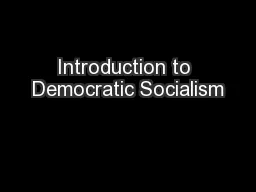PPT-Socialism, Marxism and Communism
Author : tatiana-dople | Published Date : 2017-03-30
Who is Marx MARXISM Meaning Encompasses many political theories advocated by Karl Marx and Frederick Engels Human actions and institutions are economically determined
Presentation Embed Code
Download Presentation
Download Presentation The PPT/PDF document "Socialism, Marxism and Communism" is the property of its rightful owner. Permission is granted to download and print the materials on this website for personal, non-commercial use only, and to display it on your personal computer provided you do not modify the materials and that you retain all copyright notices contained in the materials. By downloading content from our website, you accept the terms of this agreement.
Socialism, Marxism and Communism: Transcript
Download Rules Of Document
"Socialism, Marxism and Communism"The content belongs to its owner. You may download and print it for personal use, without modification, and keep all copyright notices. By downloading, you agree to these terms.
Related Documents














